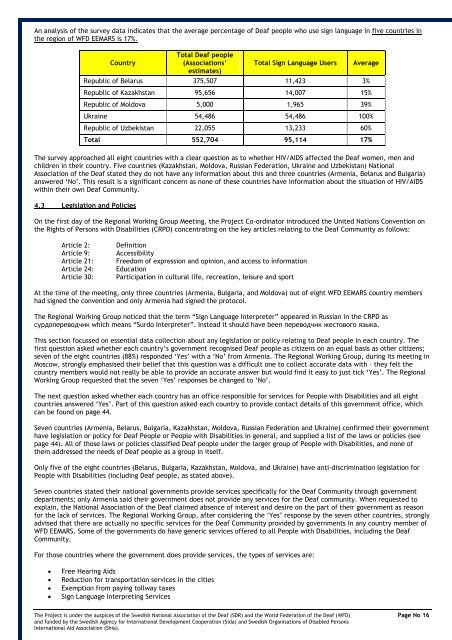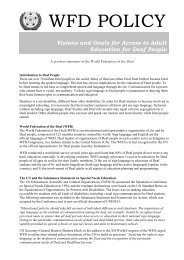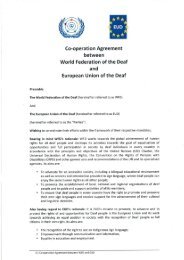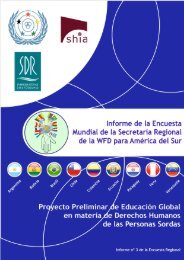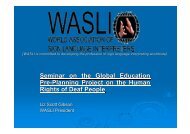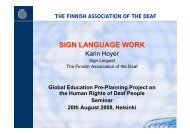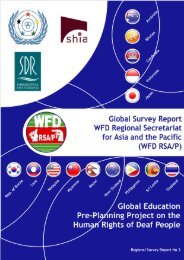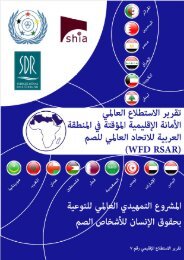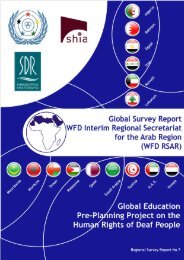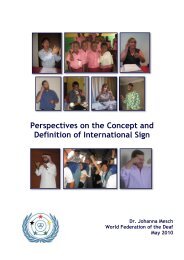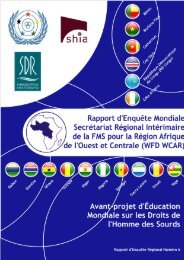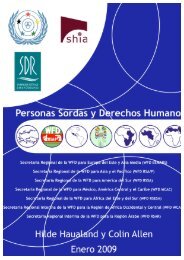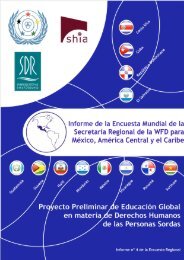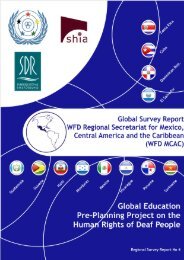Page No 1 - World Federation of the Deaf
Page No 1 - World Federation of the Deaf
Page No 1 - World Federation of the Deaf
You also want an ePaper? Increase the reach of your titles
YUMPU automatically turns print PDFs into web optimized ePapers that Google loves.
An analysis <strong>of</strong> <strong>the</strong> survey data indicates that <strong>the</strong> average percentage <strong>of</strong> <strong>Deaf</strong> people who use sign language in five countries in<br />
<strong>the</strong> region <strong>of</strong> WFD EEMARS is 17%.<br />
Country<br />
Total <strong>Deaf</strong> people<br />
(Associations’ Total Sign Language Users Average<br />
estimates)<br />
Republic <strong>of</strong> Belarus 375,507 11,423 3%<br />
Republic <strong>of</strong> Kazakhstan 95,656 14,007 15%<br />
Republic <strong>of</strong> Moldova 5,000 1,965 39%<br />
Ukraine 54,486 54,486 100%<br />
Republic <strong>of</strong> Uzbekistan 22,055 13,233 60%<br />
Total 552,704 95,114 17%<br />
The survey approached all eight countries with a clear question as to whe<strong>the</strong>r HIV/AIDS affected <strong>the</strong> <strong>Deaf</strong> women, men and<br />
children in <strong>the</strong>ir country. Five countries (Kazakhstan, Moldova, Russian <strong>Federation</strong>, Ukraine and Uzbekistan) National<br />
Association <strong>of</strong> <strong>the</strong> <strong>Deaf</strong> stated <strong>the</strong>y do not have any information about this and three countries (Armenia, Belarus and Bulgaria)<br />
answered ‘<strong>No</strong>’. This result is a significant concern as none <strong>of</strong> <strong>the</strong>se countries have information about <strong>the</strong> situation <strong>of</strong> HIV/AIDS<br />
within <strong>the</strong>ir own <strong>Deaf</strong> Community.<br />
4.3 Legislation and Policies<br />
On <strong>the</strong> first day <strong>of</strong> <strong>the</strong> Regional Working Group Meeting, <strong>the</strong> Project Co-ordinator introduced <strong>the</strong> United Nations Convention on<br />
<strong>the</strong> Rights <strong>of</strong> Persons with Disabilities (CRPD) concentrating on <strong>the</strong> key articles relating to <strong>the</strong> <strong>Deaf</strong> Community as follows:<br />
Article 2:<br />
Article 9:<br />
Article 21:<br />
Article 24:<br />
Article 30:<br />
Definition<br />
Accessibility<br />
Freedom <strong>of</strong> expression and opinion, and access to information<br />
Education<br />
Participation in cultural life, recreation, leisure and sport<br />
At <strong>the</strong> time <strong>of</strong> <strong>the</strong> meeting, only three countries (Armenia, Bulgaria, and Moldova) out <strong>of</strong> eight WFD EEMARS country members<br />
had signed <strong>the</strong> convention and only Armenia had signed <strong>the</strong> protocol.<br />
The Regional Working Group noticed that <strong>the</strong> term “Sign Language Interpreter” appeared in Russian in <strong>the</strong> CRPD as<br />
сурдопереводчик which means “Surdo Interpreter”. Instead it should have been переводчик жестового языка.<br />
This section focussed on essential data collection about any legislation or policy relating to <strong>Deaf</strong> people in each country. The<br />
first question asked whe<strong>the</strong>r each country’s government recognised <strong>Deaf</strong> people as citizens on an equal basis as o<strong>the</strong>r citizens;<br />
seven <strong>of</strong> <strong>the</strong> eight countries (88%) responded ‘Yes’ with a ‘<strong>No</strong>’ from Armenia. The Regional Working Group, during its meeting in<br />
Moscow, strongly emphasised <strong>the</strong>ir belief that this question was a difficult one to collect accurate data with – <strong>the</strong>y felt <strong>the</strong><br />
country members would not really be able to provide an accurate answer but would find it easy to just tick ‘Yes’. The Regional<br />
Working Group requested that <strong>the</strong> seven ‘Yes’ responses be changed to ‘<strong>No</strong>’.<br />
The next question asked whe<strong>the</strong>r each country has an <strong>of</strong>fice responsible for services for People with Disabilities and all eight<br />
countries answered ‘Yes’. Part <strong>of</strong> this question asked each country to provide contact details <strong>of</strong> this government <strong>of</strong>fice, which<br />
can be found on page 44.<br />
Seven countries (Armenia, Belarus, Bulgaria, Kazakhstan, Moldova, Russian <strong>Federation</strong> and Ukraine) confirmed <strong>the</strong>ir government<br />
have legislation or policy for <strong>Deaf</strong> People or People with Disabilities in general, and supplied a list <strong>of</strong> <strong>the</strong> laws or policies (see<br />
page 44). All <strong>of</strong> those laws or policies classified <strong>Deaf</strong> people under <strong>the</strong> larger group <strong>of</strong> People with Disabilities, and none <strong>of</strong><br />
<strong>the</strong>m addressed <strong>the</strong> needs <strong>of</strong> <strong>Deaf</strong> people as a group in itself.<br />
Only five <strong>of</strong> <strong>the</strong> eight countries (Belarus, Bulgaria, Kazakhstan, Moldova, and Ukraine) have anti-discrimination legislation for<br />
People with Disabilities (including <strong>Deaf</strong> people, as stated above).<br />
Seven countries stated <strong>the</strong>ir national governments provide services specifically for <strong>the</strong> <strong>Deaf</strong> Community through government<br />
departments; only Armenia said <strong>the</strong>ir government does not provide any services for <strong>the</strong> <strong>Deaf</strong> community. When requested to<br />
explain, <strong>the</strong> National Association <strong>of</strong> <strong>the</strong> <strong>Deaf</strong> claimed absence <strong>of</strong> interest and desire on <strong>the</strong> part <strong>of</strong> <strong>the</strong>ir government as reason<br />
for <strong>the</strong> lack <strong>of</strong> services. The Regional Working Group, after considering <strong>the</strong> ‘Yes’ response by <strong>the</strong> seven o<strong>the</strong>r countries, strongly<br />
advised that <strong>the</strong>re are actually no specific services for <strong>the</strong> <strong>Deaf</strong> Community provided by governments in any country member <strong>of</strong><br />
WFD EEMARS. Some <strong>of</strong> <strong>the</strong> governments do have generic services <strong>of</strong>fered to all People with Disabilities, including <strong>the</strong> <strong>Deaf</strong><br />
Community.<br />
For those countries where <strong>the</strong> government does provide services, <strong>the</strong> types <strong>of</strong> services are:<br />
• Free Hearing Aids<br />
• Reduction for transportation services in <strong>the</strong> cities<br />
• Exemption from paying tollway taxes<br />
• Sign Language Interpreting Services<br />
The Project is under <strong>the</strong> auspices <strong>of</strong> <strong>the</strong> Swedish National Association <strong>of</strong> <strong>the</strong> <strong>Deaf</strong> (SDR) and <strong>the</strong> <strong>World</strong> <strong>Federation</strong> <strong>of</strong> <strong>the</strong> <strong>Deaf</strong> (WFD) <strong>Page</strong> <strong>No</strong> 16<br />
and funded by <strong>the</strong> Swedish Agency for International Development Cooperation (Sida) and Swedish Organisations <strong>of</strong> Disabled Persons<br />
International Aid Association (Shia).


